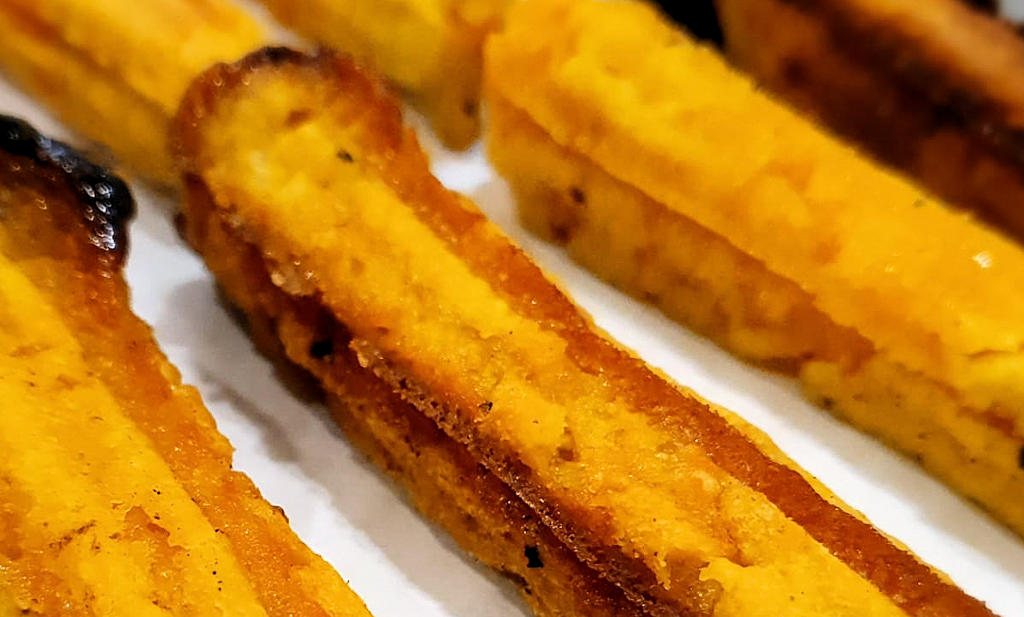The story of Espigas Doces began in the 1940s, with the visionary pastry chef Henrique Flórido hailing from Montemor-o-Velho. Inspired by the bountiful agricultural landscape of the Baixo Mondego region, adorned with waving wheat fields and lush corn crops, Flórido sought to pay homage to the hardworking farmers and the fertile land that sustained them. Thus, he embarked on a quest to create a pastry that would capture the essence of an ear of wheat.
Dubbed Espiga Doce, meaning "sweet ear" in Portuguese, Flórido meticulously selected ingredients to reflect the local produce and flavors. He combined corn flour and wheat flour to form a delicate dough, enriching it with eggs for color and richness. Vegetable fat was introduced to impart a flaky and crispy texture, while sugar added a touch of sweetness. Finally, a sprinkle of cinnamon added a delightful hint of spice, elevating the flavor profile of these delectable pastries.
Word quickly spread about Flórido's creation, and his Espigas Doces gained popularity among locals and visitors alike. The pastries graced the shelves of his shop in Montemor-o-Velho, captivating the palates of those who ventured within. Flórido's talent and innovation were further recognized as he participated in various gastronomic fairs and festivals, where his Espigas Doces garnered acclaim and garnered several prestigious awards. Though Henrique Flórido passed away in 1987, his legacy endures through his beloved Espigas Doces.
Espigas Doces transcend their status as a mere pastry and hold a deeper meaning, embodying the essence of Portuguese culture and traditions. They reflect the profound influence of various historical periods and regions on the nation's cuisine, weaving a tapestry of flavors and techniques.
One prominent influence on Portuguese gastronomy is the Moorish heritage. The Moors, a Muslim people who ruled parts of the Iberian Peninsula from the 8th to the 15th century, left an indelible mark on Portuguese culinary traditions. They introduced an array of ingredients and techniques, including sugar, spices, almonds, citrus fruits, rice, and pastry making. Espigas Doces bear traces of this influence through the use of sugar and cinnamon, echoing the flavors found in pastries such as Pastéis de Nata (custard tarts) and Pastéis de Tentúgal (thin pastry rolls filled with egg yolk cream), which are cherished delights in Portugal.
Lisbon.vip Recommends
Regional influences further contribute to the diversity of Portuguese cuisine. Although Portugal may be small in size, its varied landscapes, climates, and culinary traditions give rise to a tapestry of unique specialties that reflect the history, culture, and identity of each region. Espigas Doces, with their distinct flavors and presentation, serve as a delicious testament to this regional diversity. Each bite encapsulates a journey through the agricultural heritage of Baixo Mondego, offering a taste of the land's abundance and the labor of its dedicated farmers.
Espigas Doces are more than a treat; they represent the resilience and creativity of the Portuguese people. They embody a cultural heritage passed down through generations, serving as a delightful reminder of the nation's traditions and the flavors that have shaped its culinary identity.
As a visitor to Lisbon, immersing yourself in the vibrant tapestry of Portuguese culture and cuisine is a must. Indulging in the flavors of Espigas Doces offers a unique opportunity to savor the essence of a nation's culinary heritage. These pastries, with their rich history, delightful flavors, and captivating influences, beckon you to embrace the traditions and immerse yourself in the gastronomic wonders that Lisbon and Portugal have to offer.



